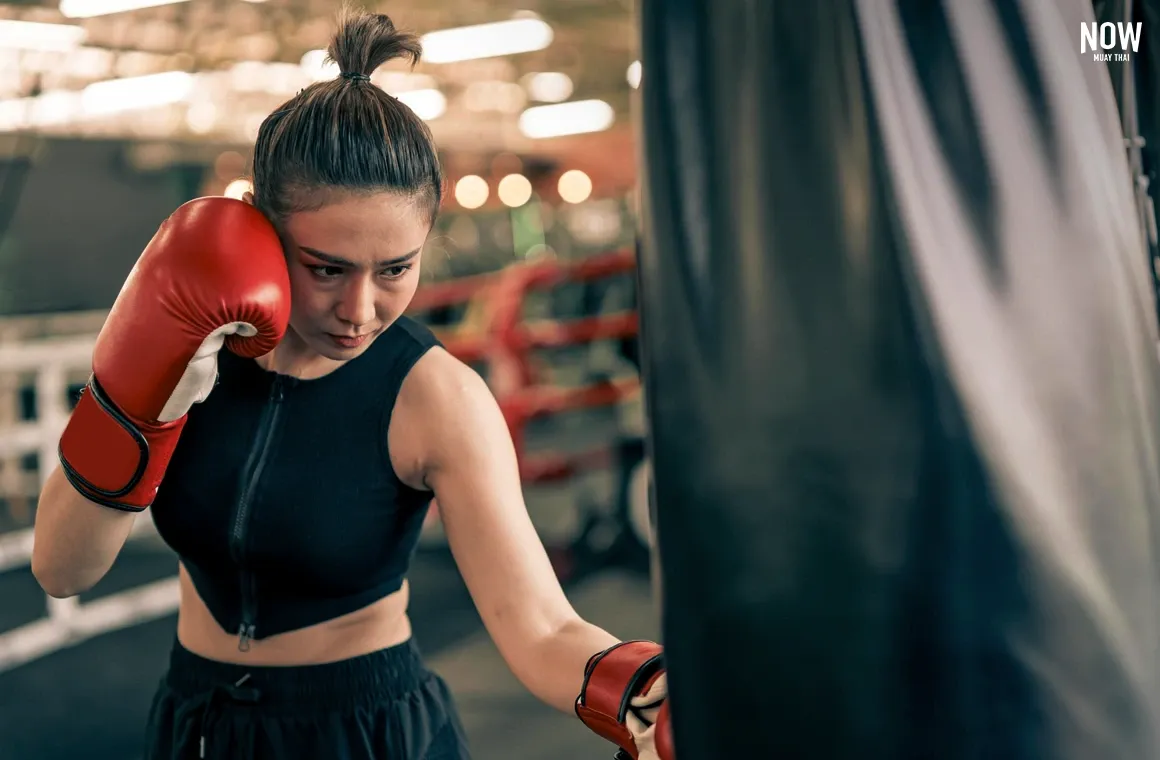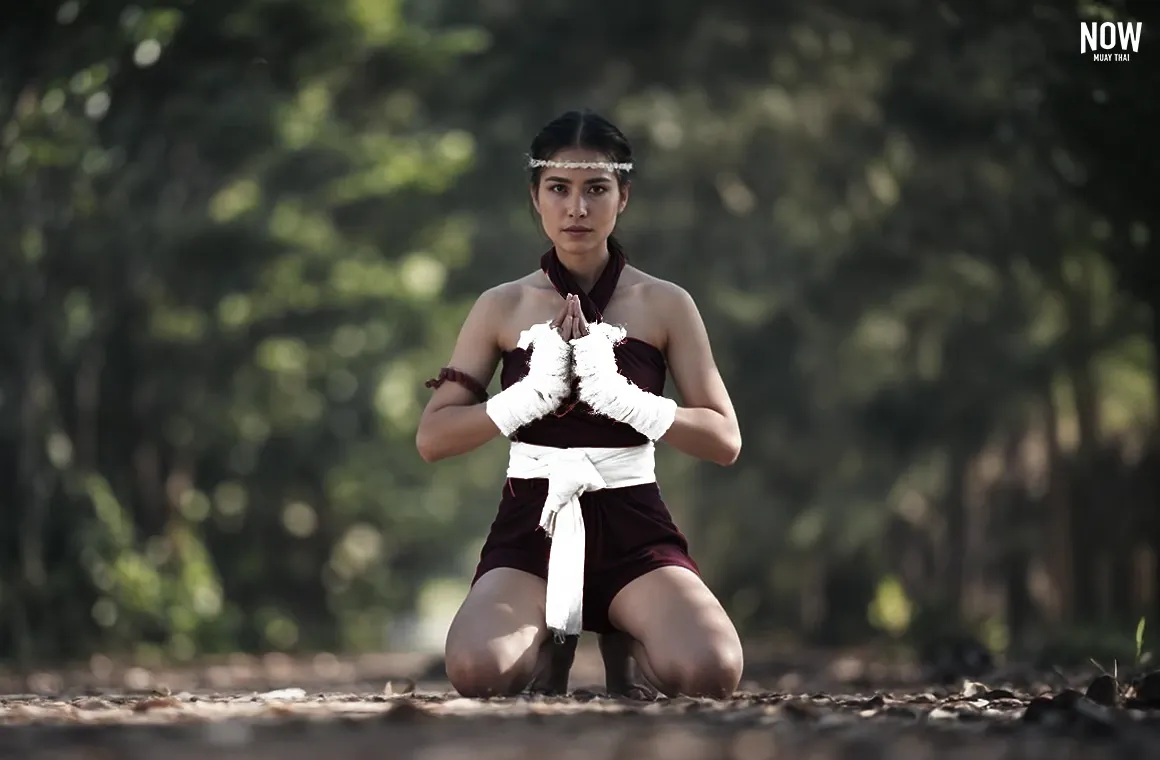0 / 32
0 / 32
Beyond the Ring: Muay Thai's Impact on Body & Mental Health
November 7, 2024

Muay Thai isn’t just a combat sport; it’s a powerful practice that cultivates mental health and physical strength. With each session, practitioners engage in movements that challenge both body and mind, developing resilience, focus, and emotional control. This combination of mental discipline and rigorous physical training makes Muay Thai an effective way to improve mental health and overall well-being. Let’s explore how Muay Thai training builds mental strength, reduces stress, and promotes a balanced lifestyle through both physical and mental conditioning.
Building Mental Discipline and Resilience Through Muay Thai Training
 A woman practices Muay Thai, showcasing focus and determination. Muay Thai’s rigorous training helps build mental resilience, teaching the ability to stay centered and composed under stress—a powerful boost for mental health.
A woman practices Muay Thai, showcasing focus and determination. Muay Thai’s rigorous training helps build mental resilience, teaching the ability to stay centered and composed under stress—a powerful boost for mental health.
Muay Thai training demands unwavering focus, determination, and self-discipline. Every kick, punch, and defensive move requires mental clarity and a connection between mind and body. To master each technique, practitioners must be present in the moment, fully concentrating on each movement. This intense focus sharpens mental clarity, grounding fighters in the present and helping them push past distractions—skills that extend far beyond the ring and into everyday life.
Repetitive Practice Builds Mental Endurance
At the core of Muay Thai training is repetitive drilling. Practicing the same techniques over time strengthens muscle memory, mental endurance, and patience. Though repetitive, these drills instill a sense of commitment and resilience, teaching practitioners to persevere through discomfort and frustration. This mental endurance is crucial not only for beginners but for all practitioners who aspire to long-term growth. As mental endurance builds, so does resilience, which strengthens the mind to face any challenge.
Focus Under Pressure in Muay Thai
The ability to stay focused under stress is one of Muay Thai’s unique contributions to mental health. Whether during sparring sessions or competitive matches, practitioners learn to ignore distractions, trust their training, and anticipate their opponent’s next move. This intense focus strengthens mental agility, encouraging practitioners to respond calmly and strategically to high-pressure situations. By training the mind to handle stress in the ring, Muay Thai practitioners also cultivate resilience and clarity that benefit daily life.
Techniques to Cultivate Mental Strength and Agility
 A woman practicing Muay Thai demonstrates her powerful punch, showcasing strength and confidence gained from daily training. Consistent practice builds physical power and reveals her full potential in the art.
A woman practicing Muay Thai demonstrates her powerful punch, showcasing strength and confidence gained from daily training. Consistent practice builds physical power and reveals her full potential in the art.
Anticipation Training: Strengthening Mental Agility
One key skill in Muay Thai is learning to read an opponent’s body language to anticipate attacks. This is done through reactive sparring drills that mimic real-life situations, where practitioners must react swiftly and precisely to unpredictable moves. This practice builds mental agility, allowing fighters to recognize patterns and respond effectively. The skill of reading cues also helps practitioners develop sharper instincts and the confidence to face unpredictable situations calmly.
Visualization and Shadow Boxing
Shadow boxing is more than just physical practice; it’s a powerful mental exercise. By visualizing opponents, fighters mentally prepare for various scenarios, rehearsing movements in their mind to improve decision-making and response time. This visualization not only sharpens focus but also builds mental resilience, as fighters learn to anticipate and respond to potential challenges. This practice fosters quick thinking, an essential skill for staying composed under pressure, and boosts mental preparedness.
Mindfulness and Breath Control
Breath control is a critical component of Muay Thai, helping fighters remain calm, clear-headed, and focused. Practicing slow, deep breaths helps regulate the nervous system, which is particularly useful for managing stress. Deep breathing techniques also enhance physical endurance and help fighters maintain mental clarity during high-intensity moments. Breath control becomes an anchor, allowing practitioners to stay grounded and composed no matter the intensity of their workout, which can translate into improved mental health and stress management.
Practicing Defensive Techniques and Counter-Attacks
Muay Thai training includes defensive techniques like blocking, parrying, and counter-attacking. Learning these skills requires concentration, patience, and a willingness to take calculated risks. Drills that focus on counter-attacking help fighters build mental toughness and quick reflexes, preparing them to spot and seize opportunities while remaining adaptable. This adaptability encourages a sense of self-confidence and the courage to take on life’s challenges, both inside and outside the ring.
The Art of Patience: Progress Takes Time
 A woman practices Muay Thai defensive techniques, including blocking, parrying, and counter-attacking. These skills demand focus, patience, and calculated risk-taking, with counter-attack drills building her mental resilience and quick reflexes.
A woman practices Muay Thai defensive techniques, including blocking, parrying, and counter-attacking. These skills demand focus, patience, and calculated risk-taking, with counter-attack drills building her mental resilience and quick reflexes.
Learning Muay Thai is a journey that requires patience, as each skill is built incrementally. Initial progress might feel slow, but the discipline teaches that small, consistent improvements are part of the path to mastery. As practitioners focus on perfecting stances, strikes, and defensive moves, they learn to appreciate the process rather than focusing solely on the outcome. This patience transfers into everyday life, encouraging calmness, stress management, and a balanced perspective on long-term goals.
Over time, the patience developed through Muay Thai training serves as a reminder that significant achievements take time, reinforcing resilience and mental endurance. Practitioners learn to face life’s challenges with a composed, mindful approach, helping them manage stress and pursue personal and professional goals with confidence and persistence.
Cultural and Spiritual Aspects of Muay Thai
 A woman performs the Wai Kru, honoring the cultural and spiritual aspects of Muay Thai. This traditional ritual reflects respect, gratitude, and connection to the art's deep Thai heritage.
A woman performs the Wai Kru, honoring the cultural and spiritual aspects of Muay Thai. This traditional ritual reflects respect, gratitude, and connection to the art's deep Thai heritage.
Muay Thai’s traditions go beyond physical practice, offering mental and spiritual benefits that enhance mental health. The Wai Kru ceremony, a pre-fight ritual, serves as a grounding practice that honors teachers, heritage, and the art itself. This tradition emphasizes respect and humility, teaching fighters to appreciate their progress and recognize the support of those who guide them. Engaging in Wai Kru helps practitioners connect with Muay Thai’s deeper cultural roots, fostering a sense of mental clarity and purpose that transcends physical training.
Training in Thailand allows practitioners to fully immerse themselves in Muay Thai culture, connecting with the spiritual aspects of the art. Experiencing Muay Thai within its cultural context reinforces the value of respect, mindfulness, and mental strength. This cultural exchange enriches the mental and emotional well-being of practitioners, helping them appreciate Muay Thai’s heritage and build inner resilience.
Start Your Mental and Physical Transformation with Muay Thai
 A woman enjoys the scenic view of James Bond Island (Koh Tapu) in Phang Nga Bay, surrounded by stunning natural beauty. The image invites everyone to experience Muay Thai training amidst Thailand's breathtaking landscapes.
A woman enjoys the scenic view of James Bond Island (Koh Tapu) in Phang Nga Bay, surrounded by stunning natural beauty. The image invites everyone to experience Muay Thai training amidst Thailand's breathtaking landscapes.
Muay Thai is more than a workout—it’s a transformative journey that enhances mental resilience, focus, and discipline. Through dedicated practice, Muay Thai builds both mental and physical fortitude, equipping practitioners with the tools to handle life’s challenges confidently. If you’re seeking an experience that blends fitness, mental health, and cultural discovery, Muay Thai offers a dynamic path toward personal growth. For an authentic experience, consider training in Thailand through platforms like Now Muay Thai, where you can fully embrace Muay Thai’s cultural roots and begin a life-changing journey of mental and physical empowerment.
Learn more about Muay Thai
Back








